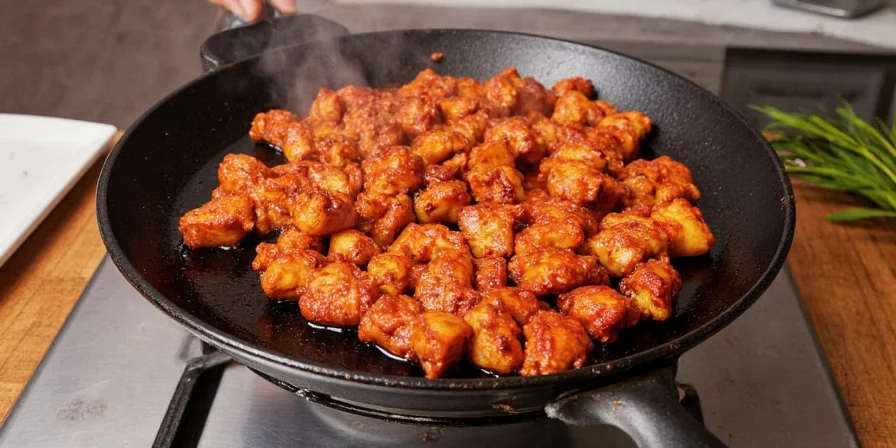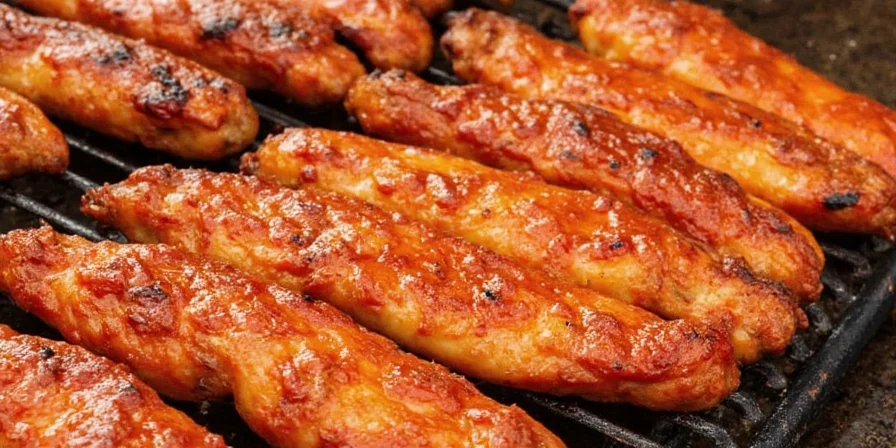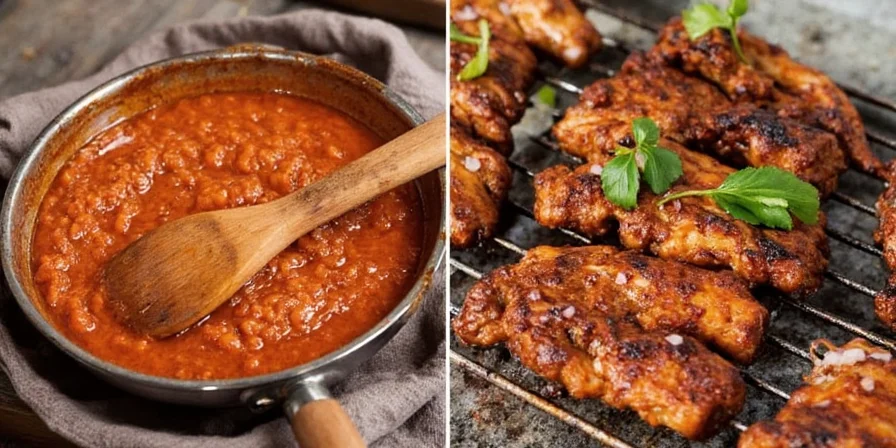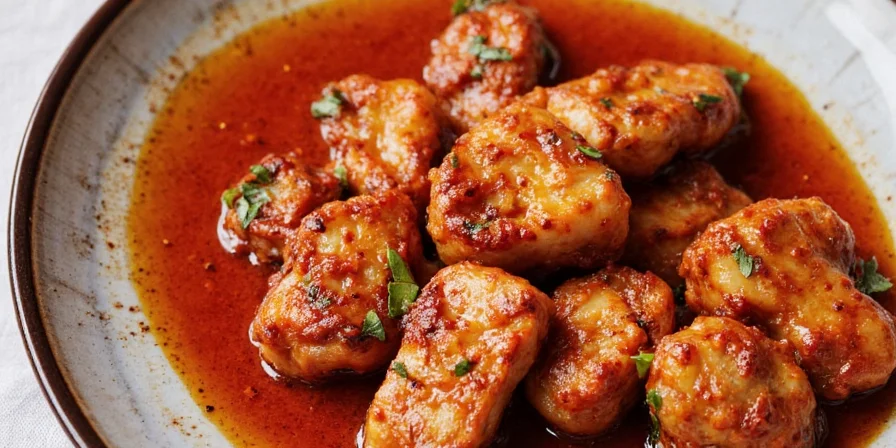The Sizzling Secrets of Korean Marinade Sauces: A Spicy Journey Around the Grill
Ever bitten into a piece of bulgogi and wondered how it manages to be both sweet, savory, spicy, and tender all at once? The secret lies in the Korean marinade sauce, a flavor bomb that turns even the humblest cut of meat into a culinary masterpiece.
In this article, we're diving deep into the world of Korean marinade sauces. Whether you're a professional chef looking to spice up your menu or a home cook who just can’t resist the allure of gochujang-laced meats, you’ll find something sizzling here!
Contents
- What Is a Korean Marinade Sauce?
- Key Ingredients That Make It Magic
- Top 5 Korean Marinade Sauces Every Griller Should Know
- How to Make Your Own Korean Marinade at Home
- Pro Tips for Using Korean Marinades Like a Boss
- Marinade vs. Dipping Sauce: What’s the Difference?
- Korean Marinade Goes Global – Fusion Flavors
- Common Mistakes (And How to Avoid Them)
- Conclusion

What Is a Korean Marinade Sauce?
Unlike Western-style marinades that often rely on acid like vinegar or citrus to break down proteins, Korean marinades are more about building layers of umami, sweetness, heat, and fragrance. They’re typically used for grilling — think buldak (spicy chicken), galbi (beef short ribs), and samgyeopsal (pork belly) — but also appear in stews and stir-fries.
At their core, Korean marinades marry fermented ingredients (like soy sauce, gochujang, or doenjang) with aromatics like garlic, ginger, and sesame oil. Often, fruits such as pear or kiwi are added to help tenderize meat naturally through enzymes.

Key Ingredients That Make It Magic
Let’s take a closer look at what makes these marinades so uniquely Korean:
- Gochujang – Fermented red chili paste, rich, sweet, and deeply spicy.
- Doenjang – Another fermented soybean paste, earthier and saltier than miso.
- Soy Sauce – Adds saltiness and depth; some recipes use Korean-style (ganjang) for a cleaner taste.
- Sesame Oil – Toasted sesame oil gives that unmistakable nutty aroma.
- Sugar or Honey – Balances out salt and spice; often used in galbi marinades.
- Fruits (Pear, Kiwi, Apple) – Natural tenderizers and flavor boosters.
- Garlic & Ginger – Essential aromatics that bring warmth and complexity.
- Rice Wine or Mirin – Helps meld flavors and adds slight sweetness.
| Ingredient | Function | Alternative |
|---|---|---|
| Gochujang | Heat & Umami | Miso + Chili Powder |
| Pear | Tenderizer | Pineapple Juice |
| Sesame Oil | Aroma | Toasted Peanut Oil |

Top 5 Korean Marinade Sauces Every Griller Should Know
Ready to level up your next barbecue session? Here are five legendary marinade sauces from Korea’s grill scene:
- Buldak Marinade: Fiery, sticky, and loaded with gochujang. Perfect for chicken wings or thighs.
- Galbi Jjim Marinade: Sweet and savory, using soy sauce, sugar, and pear for fall-off-the-bone short ribs.
- Dakgalbi Marinade: A spicy stir-fry classic made with gochujang, vegetables, and chewy rice cakes.
- Ojingeo Gui Marinade: For squid lovers! Lighter with sesame oil, garlic, and pepper.
- Jeyuk Bokkeum Marinade: Pork stir-fried in a gochujang-based sauce—perfect for taco nights gone Korean!

How to Make Your Own Korean Marinade at Home
You don't need a PhD in fermentation science to whip up a killer marinade. Here's a simple recipe to get you started:
Buldak-Inspired Chicken Marinade
- 4 tbsp gochujang
- 2 tbsp soy sauce
- 1 tbsp honey or brown sugar
- 1 tbsp rice wine (or mirin)
- 1 tsp toasted sesame oil
- 1 clove garlic, minced
- ½ small pear or apple, blended
- Optional: gochugaru (red pepper flakes) for extra kick
Instructions: Mix everything together, pour over chicken thighs or drumsticks, and refrigerate for at least 4 hours. Grill or pan-sear until charred and crispy.

Pro Tips for Using Korean Marinades Like a Boss
Want to impress your friends or just upgrade your solo dinner game? Here are our top pro tips:
- Time is your friend: Marinate for at least 4–6 hours; overnight is best for deep flavor.
- Don’t throw away the leftovers: Reuse the marinade (after boiling) as a basting sauce while grilling.
- Balance heat and sweetness: If your marinade is too spicy, add a bit of honey or fruit puree to mellow it out.
- Layer your flavors: Brush a second layer of sauce during cooking for extra gloss and punch.
- Think beyond meat: Try marinating tofu, eggplant, or mushrooms for a vegan twist.
Marinade vs. Dipping Sauce: What’s the Difference?
It’s easy to confuse a marinade with a dipping sauce, but they play very different roles in Korean cuisine:
| Feature | Marinade | Dipping Sauce |
|---|---|---|
| Purpose | Infuse flavor into food before cooking | Enhance flavor after cooking |
| Texture | Thicker, oilier, and sometimes chunky | Thinner, smoother, liquid-based |
| Common Use | BBQ meats, roasted veggies | Wraps, dumplings, noodles |
| Typical Base | Gochujang, soy, sesame oil | Soy sauce, vinegar, chili oil |

Korean Marinade Goes Global – Fusion Flavors
Korean flavors have gone global, and chefs around the world are experimenting with Korean marinades in exciting ways. Here are some popular fusion takes:
- Korean Tacos: Marinated bulgogi beef wrapped in corn tortillas with kimchi slaw.
- Korean Pizza: Gochujang-marinated chicken, mozzarella, and scallions.
- Korean Burgers
- Korean Fried Chicken Wings: Double-fried and tossed in a spicy gochujang glaze.
- Korean Quesadillas: Bulgogi beef, cheese, and pickled radish wrapped in flour tortillas.
Common Mistakes (And How to Avoid Them)
Even seasoned cooks can slip up when working with powerful ingredients. Here are the most common mistakes — and how to dodge them:
- Over-marinating delicate meats: Fish and shrimp can become mushy if left too long. Stick to 1–2 hours max.
- Using raw marinade on cooked food: Always reserve a portion of your marinade before adding to raw meat to avoid cross-contamination.
- Ignoring natural tenderizers: If you skip the fruit, your meat might not be as tender. Especially important for cheaper cuts.
- Not adjusting seasoning: Taste your marinade before using — salt and spice levels can vary depending on brand or ingredient freshness.
- Cooking too hot too soon: High heat will burn your marinade before the meat is done. Start low and finish high for the perfect char.
Conclusion
Korean marinade sauces are more than just a trend — they’re a centuries-old tradition of balancing flavor, texture, and technique. From fiery gochujang to sweet soy blends, these sauces transform the simplest ingredients into unforgettable meals.
Whether you're marinating pork belly for your next Korean BBQ night or spicing up your weekend tacos, mastering these sauces opens the door to a whole new world of flavor. So fire up the grill, grab your favorite protein, and let the marinade do the heavy lifting.












 浙公网安备
33010002000092号
浙公网安备
33010002000092号 浙B2-20120091-4
浙B2-20120091-4